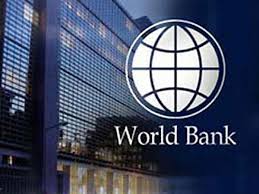
The global slowdown is beginning as government and corporate debt rises, especially among the poorest countries, while mounting interest rates increase borrowing costs, the bank said in its semi-annual Global Economic Prospects report.
The report was markedly more pessimistic than a year ago - when the outlook was for synchronised global growth - and peppered with exhortations to take "urgent", "imperative" or "critical" action.
"Risks are rising," senior World Bank economist Ayhan Kose told AFP. "The global economy is going through a difficult period. Skies are darkening and we see the global economy slowing."
Pakistan ranks 13th least prosperous country on Legatum Prosperity Index
Growth of the world economy is expected to slow to 2.9% this year and 2.8% in 2020, slightly below the previous forecast, and the estimates for nearly all regions and countries were downgraded.
At the centre of the turmoil, US economic growth is expected to slow this year by four-tenths of a point, falling to 2.5%, down from 2.9% in 2018, and to slow even further next year to 1.7%.
China's economy is also slowing amid the trade dispute and growth should slip to 6.2% this year and next.
Kose, who heads the World Bank's Development Prospects Group - which twice a year produces the global economic forecasts - said he hoped for a resolution but meanwhile urged governments to prepare for a difficult road ahead.
"Global growth is still robust but whether a storm will hit or it will clear highly depends on how policymakers are going to react," he said.
‘Pakistan needs to expand economic links’
Though the bank still sees a low probability of recession in the US, even a small slowdown has an outsize effect. If the US and China slow by a full percentage point, it will cut global growth by nearly the same amount, with dire consequences for many countries.
"Trade tensions are already affecting activity around the world," Kose said, and it could get worse.
The report sharply downgraded the growth forecasts for key emerging market economies like Mexico, South Africa and Russia, as well as for crisis-struck countries Turkey and Argentina. So far, India and Indonesia have escaped that fate.
But the US and China together account for about a third of global GDP and 20% of global trade.
"How they resolve their differences is going to be very important how global economy is going to shape this year," said Kose.

















COMMENTS
Comments are moderated and generally will be posted if they are on-topic and not abusive.
For more information, please see our Comments FAQ